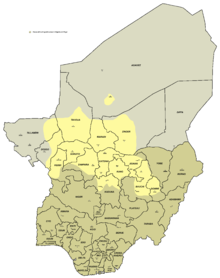
Back Hausa Afrikaans हौसा भाषा ANP اللغة الهوسية Arabic الهوسيه ARZ Idioma ḥausa AST Хаўса (мова) Byelorussian Хауса (език) Bulgarian হাউসা ভাষা Bengali/Bangla Haousaeg Breton Haussa Catalan
This article needs additional citations for verification. (October 2019) |
| Hausa | |
|---|---|
| |
| Pronunciation | /ˈhaʊsə/ |
| Native to | |
| Region | West Africa |
| Ethnicity | Hausa |
| Speakers | L1: 54 million (2021–2023)[1] |
| Official status | |
Official language in | |
Recognised minority language in | |
| Language codes | |
| ISO 639-1 | ha |
| ISO 639-2 | hau |
| ISO 639-3 | hau |
| Glottolog | haus1257 |
| Linguasphere | 19-HAA-b |
 Areas of Niger and Nigeria where Hausa people are based. Hausa tribes are to the north. | |
Hausa (/ˈhaʊsə/;[2] Harshen/Halshen Hausa ; Ajami: هَرْشٜىٰن هَوْسَا) is a Chadic language that is spoken by the Hausa people in the northern parts of Nigeria, Ghana, Cameroon, Benin and Togo, and the southern parts of Niger, and Chad, with significant minorities in Ivory Coast. A small number of speakers also exist in Sudan.[3][4][5]
Hausa is a member of the Afroasiatic language family[6] and is the most widely spoken language within the Chadic branch of that family. Despite originating from a non-tonal language family, Hausa utilizes differences in pitch to distinguish words and grammar. Ethnologue estimated that it was spoken as a first language by some 54 million people and as a second language by another 34 million, bringing the total number of Hausa speakers to an estimated 88 million.[1]
In Nigeria, the Hausa film industry is known as Kannywood.[7]
- ^ a b c d Hausa at Ethnologue (27th ed., 2024)

- ^ Bauer (2007), p. ?.
- ^ Wolff, H. Ekkehard. "Hausa language". Encyclopædia Britannica. Retrieved 2020-10-14.
- ^ "Spread of the Hausa Language". Worldmapper. Retrieved 2020-10-14.
- ^ "Hausa". Ethnologue. Retrieved 27 March 2024.
- ^ Chayes. "The Hausa Language". Website des Institutes für Asien- und Afrikawissenschaften der Humboldt-Universität zu Berlin. Retrieved 2022-02-15.
- ^ "Nigerian actress Rahama Sadau banned after on-screen hug". BBC News. 2016-10-03. Retrieved 2020-10-29.